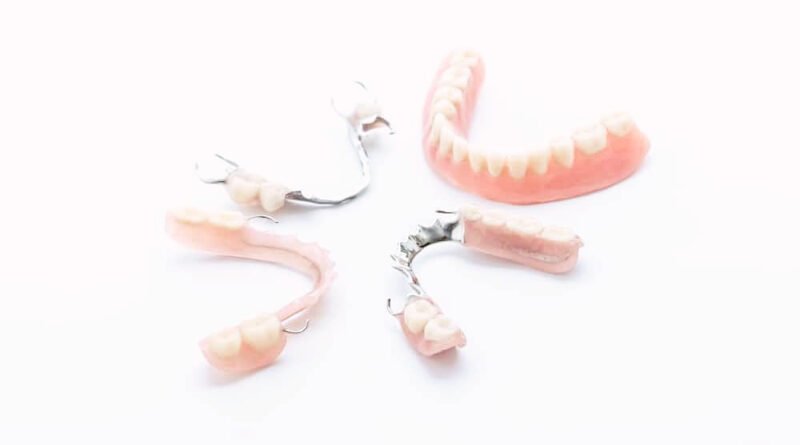Partial vs. Full Dentures: What’s the Difference?
As a tooth loss patient researching dentures, you may come across terms like “partial dentures” and “full dentures”. These are two distinct types of dentures that are recommended to people who may have lost some or all of their teeth. Understanding the distinctions between partial and full dentures can help you make a more informed choice. In this article, we’ll cover the differences between these two types of dentures so you can choose the best option for your needs.
What are partial dentures?
Partial dentures are removable dental appliances designed for people who have lost multiple teeth but still have some natural teeth remaining. Rather than replacing an entire arch of teeth, partial dentures fill in the gaps between existing healthy teeth, restoring your ability to chew, speak, and smile with ease.
Features of partial dentures
Partial dentures are often recommended for patients who want a non-invasive, affordable solution that doesn’t require surgery or extensive dental work. Let’s explore the features of partial dentures below:
- Custom-fit framework: Partial dentures are custom-made to fit your mouth comfortably. They typically have a gum-colored base with replacement teeth attached to it. No matter which teeth you’re missing, your dentist can work with you to create a partial denture that hides tooth gaps.
- Metal or acrylic clasps: Partial dentures have a metal frame or clasps to help anchor the denture to your remaining natural teeth. The frame or clasp keeps the dentures from shifting or slipping when you move, eat, or go about your day.
- Natural look and feel: Modern partial dentures are designed to blend in with your natural teeth, giving you a discreet and natural-looking smile. Dentists typically design prosthetic teeth to perfectly match your remaining natural teeth.
- Improved function: By filling in gaps, partial dentures help distribute bite pressure evenly and prevent neighboring teeth from shifting out of place.
What are full dentures?
Full dentures, sometimes called complete dentures, are used when all the teeth in either the upper or lower jaw (or both) are missing. They’re designed to replace an entire arch of teeth and restore your full smile. Full dentures usually rest on your healthy gums, so they have to be custom-designed for a comfortable fit.
Features of full dentures
Full dentures are usually recommended to individuals who have lost most or all of their teeth due to injury or health conditions like gum disease. We’ve outlined a few key features below:
- Complete replacement: Full dentures rest directly on the gums and replace all of the teeth in the affected arch.
- Custom-molded for comfort: Like partials, full dentures are custom-crafted to match the contours of your mouth for a secure and comfortable fit.
- Upper and lower options: You can get full dentures for your top jaw, bottom jaw, or both, depending on your needs.
- Adhesives may be needed: Since full dentures don’t have natural teeth to anchor to, you may need a dental adhesive to keep them in place throughout the day.
Key differences between partial and full dentures
While both partial and full dentures help replace missing teeth, there are some important differences to keep in mind when choosing the right option for your smile.
- Number of teeth being replaced: Partial dentures are for those with some healthy natural teeth remaining, while full dentures are for patients who are missing all teeth in a row.
- Attachment method: Partial dentures usually attach to existing teeth using metal clasps or precision attachments. Full dentures, on the other hand, rest on the gums and may need adhesive to stay secure.
- Support and stability: Because partial dentures have anchor points, they can sometimes feel more stable during chewing and speaking. Full dentures can take some time to adjust to.
- Impact: Partial dentures maintain dental alignment by filling in spaces and preventing natural teeth from shifting. Full dentures provide support to your facial structure and may help prevent a sunken appearance.
Both partial and full dentures are designed to return your ability to speak and eat with ease. However, the choice between the two mainly depends on whether or not you still have some healthy teeth. Talk to your local dentist before getting dentures in Pembroke Pines for more information and guidance.
Also visit Digital Global Times for more quality informative content.

